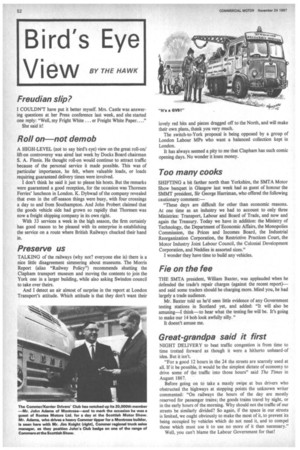Bird's Eye
Page 54

If you've noticed an error in this article please click here to report it so we can fix it.
ViewBY THE HAWK
Freudian slip?
I COULDN'T have put it better myself. Mrs. Castle was answering questions at her Press conference last week, and she started one reply: "Well, my Fright White . er Freight White Paper...." She said it!
Roll on—not demob
A HIGH-LEVEL (not to say bird's eye) view on the great roll-on/ lift-on controversy was aired last week by Docks Board chairman S. A. Finnis. He thought roll-on would continue to attract traffic because of the personal service it made possible. This was of particular importance, he felt, where valuable loads, or loads requiring guaranteed delivery times were involved.
I don't think he said it just to please his hosts. But the remarks were guaranteed a good reception, for the occasion was Thoresen Ferries' luncheon in London. K. Dybwad of the company revealed that even in the off-season things were busy, with four crossings a day to and from Southampton. And John Probert claimed that the goods vehicle side had grown so rapidly that Thoresen was now a freight shipping company in its own right.
With 33 services a week in the high season, the firm certainly has good reason to be pleased with its enterprise in establishing the service on a route where British Railways chucked their hand in.
Preserve us
TALKING of the railways (why not? everyone else is) there is a nice little disagreement simmering about museums. The Morris Report (alias "Railway Policy") recommends shutting the Clapham transport museum and moving the contents to join the York one in a larger building, while also asking Swindon council to take over theirs.
And I detect an air almost of surprise in the report at London Transport's attitude. Which attitude is that they don't want their lovely red bits and pieces dragged off to the North, and will make their own plans, thank you very much.
The switch-to-York proposal is being opposed by a group of London Labour MPs who want a balanced collection kept in London.
It has always seemed a pity to me that Clapham has such comic opening days. No wonder it loses money.
Too many cooks
SHIFTING a bit farther north than Yorkshire, the SMTA Motor Show banquet in Glasgow last week had as guest of honour the SMMT president, Sir George Harriman, who offered the following cautionary comment:—
"These days are difficult for other than economic reasons. At one time as an industry we had to account to only three Ministries: Transport, Labour and Board of Trade, and now and again the Treasury. Today we have in addition: the Ministry of Technology, the Department of Economic Affairs, the Monopolies Commission, the Prices and Incomes Board, the Industrial Reorganization Corporation, the Restrictive Practices Court, the Motor Industry Joint Labour Council, the Colonial Development Corporation, and Neddies in assorted sizes."
I wonder they have time to build any vehicles.
Fie on the fee
THE SMTA president, William Baxter, was applauded when he defended the trade's repair charges (against the recent report)— and said some traders should be charging more. Mind you, he had largely a trade audience.
Mr. Baxter told us he'd seen little evidence of any Government testing stations in Scotland yet, and added: "It will also be amusing—I think—to hear what the testing fee will be. It's going to make our 14 bob look awfully silly."
It doesn't amuse me.
Great-grandpa said it first
NIGHT DELIVERY to beat traffic congestion is from time to time trotted forward as though it were a hitherto unheard-of idea. But it isn't.
"For a good 12 hours in the 24 the streets are scarcely used at all. If it be possible, it would be the simplest dictate of economy to drive some of the traffic into those hours" said The Times in August 1867.
Before going on to take a manly swipe at bus drivers who obstructed the highways at stopping points the unknown writer commented: "On railways the hours of the day are mostly reserved for passenger trains; the goods trains travel by night, or in the early hours of the morning. Why should not the traffic of our streets be similarly divided? So again, if the space in our streets is limited, we ought obviously to make the most of it, to prevent its being occupied by vehicles which do not need it, and to compel those which must use it to use no more of it than necessary."
Well, you can't blame the Labour Government for that!












































































































































